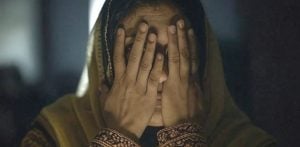Marrying him would protect Sidra from disgrace.
Jama Taqseem is drawing significant attention as its newest episodes intensify conversations about cousin marriages, emotional manipulation and misogyny.
It also addressed the longstanding tradition of forcing women into relationships they do not want.
The drama highlights these issues through multiple characters, weaving a narrative that reflects the deeply rooted cultural expectations many Pakistani families continue to impose.
Viewers are noticing how the story brings real pressures to screen, especially as it addresses the widespread practice of cousin marriages in Pakistan.
The plot becomes increasingly unsettling as Zeeshan’s mother attempts to absolve her son’s harassment by pushing Sidra into marrying him.
She argues that marrying him would protect Sidra from disgrace, revealing how victims are often forced into silence through emotional blackmail.
Faisal emerges as the voice of reason by confronting the disturbing logic that women must marry their abusers to save them from shame.
He questions his mother: “You want Sidra to marry the person who abused her? Who she hates the most in this world?”
Shafaq also challenges these mindsets by openly calling out the cultural obsession with marrying within the family despite the emotional risks involved.
Her concerns are immediately dismissed as her mother pressures her to marry Faisal as part of a reciprocal family arrangement known as ‘Watta Satta.’
She says: “Why are you talking about such things? It’s all because you use this phone. You will not say no.”
The show’s portrayal of these dynamics has resonated with audiences who praise the creators for exposing uncomfortable truths with honesty.
Another major theme receiving attention is how women are routinely blamed for marital problems regardless of the actual situation.
The latest episode shows Qais’s mother accusing Laila of neglecting her husband simply because he is suspected of cheating.
The scene captures how daughters-in-law are frequently held responsible for everything that goes wrong inside a joint household.
Earlier, the drama showed Qais’s parents complaining relentlessly about Laila’s absence, her job interview and even the food they were served.
They repeatedly threatened to leave, weaponising guilt to manipulate their son while portraying Laila as selfish and irresponsible.
Qais channelled this frustration towards Laila in a moment many viewers described as the behaviour of an immature man.
Laila responded with quiet strength by reminding him that their agreement about her working was made before marriage.
She expressed the painful reality many women face by saying:
“Whatever I do, your parents will not like me.”
The drama also exposes the hypocrisy behind the idea that the house belongs exclusively to the man and, therefore, his parents.
This contradiction becomes particularly clear when Qais’s sister questions why Laila’s parents stayed there while insisting her own parents are welcome.
The show continues to address these norms by revealing how families use emotional pressure to maintain authority over young couples.
Audiences are especially invested in Laila and Qais’s evolving relationship as tensions push them toward necessary conversations.
With each episode, Jama Taqseem pushes boundaries by showcasing harsh realities with unflinching honesty.






























































